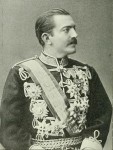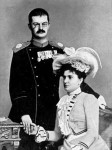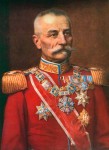You can catch up on the earlier posts in this series here (now with hopefully helpful descriptions):
- Why it’s so difficult to answer the question “Who is to blame?”
- Looking back to 1814
- Bismarck, his life and works
- France isolated, Britain’s global responsibilities
- Austria, Austria-Hungary, and the Balkan quagmire
- The Anglo-German naval race, Jackie Fisher, and HMS Dreadnought
- War with Japan, revolution at home: Russia’s self-inflicted miseries
- The First Balkan War
- The Second Balkan War
- The Entente Cordiale, Moroccan crises, and the influence of public opinion
- The Bosnian crisis of 1908
Who’s at the wheel? The less-than-transparent-or-unified governments of 1914
A common reaction (among both modern historians and lay readers) to the apparent incoherence of the decision-making process in the various great powers’ capitals is to ask just who exactly was in command when such-and-such a decision was taken. This reflects on our modern day belief that power has an identifiable source, and that actors had clear direction from a central authority. As Christopher Clark takes pains to outline in The Sleepwalkers this was not true even of the more centralized great powers:
… even a very cursory look at the governments of early twentieth-century Europe reveals that the executive structures from which policies emerged were far from unified. Policy-making was not the prerogative of single sovereign individuals. Initiatives with a bearing on the course of a country’s policy could and did emanate from quite peripheral locations in the political structure. Factional alignments, functional frictions within government, economic or financial constraints and the volatile chemistry of public opinion all exerted a constantly varying pressure on decision-making processes. As the power to shape decisions shifted from one node in the executive structure to another, there were corresponding oscillations in the tone and orientation of policy. This chaos of competing voices is crucial to understanding the periodic agitation of the European system during the last pre-war years. It also helps to explain why the July Crisis of 1914 became the most complex and opaque political crisis of modern times.
In The War That Ended Peace, Margaret MacMillan writes:
Old institutions and values were under attack and new ways and new attitudes were emerging. Their world was changing, perhaps too fast, and they had to attempt to make sense of it. “What were they thinking?” is a question often asked about the Europeans who went to war in 1914. The ideas that influenced their view of the world, what they took for granted without discussion (what the historian James Joll called “unspoken assumptions”), what was changing and what was not, all are important parts of the context within which war, even a general European war, became a possible option in 1914.
The uneasy state of the Serbian state
Serbia had been practically an independent state since shrugging off the last Ottoman military occupation in 1867 and that independence was formally recognized by the great powers in 1878 at the Congress of Berlin which was the peace conference called to end the Russo-Turkish War (which we briefly looked at in part two). One of the provisions of the treaty that strongly displeased the Serbs was that they were forbidden to take over Bosnia, which instead was placed in the care of the Austro-Hungarian empire: the Serbs had gone to war with the Ottomans in 1876 by proclaiming a union with Bosnia. The Austrians and the other great powers preferred a weakened Ottoman empire to retain titular possession of Bosnia than to allow an upstart principality to claim it.

King Milan of Serbia (via Wikipedia)
Serbia became a kingdom in 1882 under
King Milan I. Milan had been adopted into the ruling Obrenović family after the death of his father in combat against the Ottomans. When Prince Mihailo Obrenović was assassinated in 1868, Milan was the eventual choice to succeed his adopted father. Milan remained king until he unexpectedly abdicated the throne in favour of his son
Alexander in 1889. Despite having given up the throne, he returned to Serbia and eventually was appointed commander-in-chief of the Serbian army. He left that post in protest at his son’s marriage to Draga Mašin in 1900 and was banished for his pains. He died in 1901.

King Alexander and Queen Draga of Serbia (via Wikipedia)
King Alexander I did not long survive his father, being assassinated by members of an army conspiracy in 1903. The King had been ruling ever more harshly, creating much resentment through his arbitrary decrees and proclamations. The conspiracy was lead by
Captain Dragutin Dimitrijević (nicknamed “Apis”), who would also later found the secret organization
Ujedinjenje ili smrt! known as the Black Hand. The assassinations were so gory that Quentin Tarantino might have directed the scene if it was written by George R.R. Martin (as described by Christopher Clark):
According to one account, the king, flabby, bespectacled and incongruously dressed in his red silk shirt, emerged with his arms around the queen. The couple were cut down in a hail of shots at point-blank range. Petrović [the king’s adjutant], who drew a concealed revolver in a final hopeless bid to protect his master (or so it was later claimed), was also killed. An orgy of gratuitous violence followed. The corpses were stabbed with swords, torn with a bayonet, partially dismembered and hacked with an axe until they were mutilated beyond recognition, according to the later testimony of the king’s traumatized Italian barber, who was ordered to collect the bodies and dress them for burial. The body of the queen was hoisted to the railing of the bedroom window and tossed, virtually naked and slimy with gore, into the gardens. It was reported that as the assassins attempted to do the same with Alexandar, one of his hands closed momentarily around the railing. An officer hacked through the fist with a sabre and the body fell, with a sprinkle of severed digits, to the earth. By the time the assassins had gathered in the gardens to have a smoke and inspect the results of their handiwork, it had begun to rain.

King Peter I of Serbia (via Wikipedia)
King Alexander and Queen Draga had no children and the Queen’s brother was widely assumed to be the heir-presumptive. Both of the queen’s brothers and several government officials were killed in the purge following the assassinations. These actions ended the Obrenović dynasty, as Alexander was succeeded by
King Peter I, of the Karađorđević dynasty (Serbia had the misfortune of having two rival royal families from the early 1800’s to the assassination of Alexander I). King Peter’s father had been Prince of Serbia until his abdication in 1858, after which the family lived in exile. Under the pseudonym Pierre or Peter Kara, Peter had served as a junior officer on the French side in the Franco-Prussian War. Using a different pseudonym, he lead a guerilla unit against Ottoman troops in Bosnia and Herzegovina between 1875 and 1878. In 1883, he married the eldest daughter of the King of Montenegro. Through the connection between the royal families of Russia and Montenegro, two of his sons were enrolled in the Russian military academy.
Whether through fear of suffering the same kind of violent death as his predecessor or through a genuine belief in liberalization, King Peter’s early reign was marked by a return to more democratic representation and parliamentary control of the government. The Austrian government had been on relatively good terms with the former king, and viewed the increasing democratization in Serbia as a dangerous trend (for fear it would give more impetus to demands for autonomy not only in Bosnia, but also in other Slavic areas of the empire). The Wikipedia entry for King Peter’s reign is just a tad over-enthusiastic:
The Western-educated King attempted to liberalize Serbia with the goal of creating a Western-style constitutional monarchy. King Petar I became gradually very popular for his commitment to parliamentary democracy that, in spite of certain influence of military cliques in political life, functioned properly. The 1903 Constitution was a revised version of 1888 Constitution, based on the Belgian Constitution of 1831, considered as one of the most liberal in Europe.The governments were chosen from the parliamentary majority, mostly from People’s Radical Party (Narodna radikalna stranka) led by Nikola P. Pašić and Independent Radical Party (Samostalna radikalna stranka), led by Ljubomir Stojanović. King Peter himself was in favor of a broader coalition government that would boost Serbian democracy and help pursue an independent course in foreign policy. In contrast to Austrophile Obrenović dynasty, King Peter I was relying on Russia and France, which provoked rising hostility from expansionist-minded Austria-Hungary. King Peter I of Serbia paid two solemn visits to Saint-Petersbourg and Paris in 1910 and 1911 respectively, greeted as a hero of both democracy and national independence in the troublesome Balkans.
The reign of King Peter I Karadjordjević from 1903 to 1914, is remembered as the “Golden Age of Serbia” or the “Era of Pericles in Serbia”, due to the unrestricted political freedoms, free press, and cultural ascendancy among South Slavs who finally saw in democratic Serbia a Piedmont of South Slavs. King Peter I was supportive to the movement of Yugoslav unification, hosting in Belgrade various cultural gatherings. Grand School of Belgrade was upgraded into Belgrade University in 1905, with scholars of international renown such as Jovan Cvijić, Mihailo Petrović, Slobodan Jovanović, Jovan M. Žujović, Bogdan Popović, Jovan Skerlić, Sima Lozanić, Branislav Petronijević and several others.
The Black Hand: Serbia’s “plausibly deniable” interference in Bosnian affairs
The leader of the 1903 coup d’etat, former Captain, now Colonel Dragutin “Apis” Dimitrijević was in a key position indeed — he was the head of the Serbian Military Intelligence service in 1914. From that important post, he was able to conduct covert operations against the neighbouring empires with an eye to destabilization and eventual military action. In 1911, Apis established Ujedinjenje ili smrt! (the Black Hand) to enable him to conduct operations separate from — but with goals aligned with — the formal state organization. Another semi-secret pan-Slavic organization set up a few years earlier became a very valuable tool in the hands of Apis: Mlada Bosna (Young Bosnia).
Margaret MacMillan in The War That Ended Peace describes the kind of operations “Apis” set up and operated against Austria-Hungary and the Ottomans:
Within Serbia itself there was considerable support for the Young Bosnians and their activities. For a decade or more, parts of the Serbian government had encouraged the activities of quasi-military and conspiratorial organizations on the soil of Serbia’s enemies, whether the Ottoman Empire or Austria-Hungary. The army provided money and weapons for armed Serbian bands in Macedonia and smuggled weapons into Bosnia much as Iran does today with Hezbollah in Lebanon.
Margaret MacMillan describes the typical members of the Young Bosnians, who were of a type that we probably recognize more readily now than at any time since 1914:
[They] were mostly young Serb and Croat peasant boys who had left the countryside to study and work in the towns and cities of the Dual Monarchy and Serbia. While they had put on suits in place of their traditional dress and condemned the conservatism of their elders, they nevertheless found much in the modern world bewildering and disturbing. It is hard not to compare them to the extreme groups among Islamic fundamentalists such as Al Qaeda a century later. Like those later fanatics, the Young Bosnians were usually fiercely puritanical, despising such things as alcohol and sexual intercourse. They hated Austria-Hungary in part because they blamed it for corrupting its South Slav subjects. Few of the Young Bosnians had regular jobs. Rather they depended on handouts from their families, with whom they had usually quarreled. They shared their few possessions, slept on each other’s floors, and spent hours over a single cup of coffee in cheap cafés arguing about life and politics. They were idealistic, and passionately committed to liberating Bosnia from foreign rule and to building a new and fairer world. Strongly influenced by the great Russian revolutionaries and anarchists, the Young Bosnians believed that they could only achieve their goals through violence and, if necessary, the sacrifice of their own lives.
Apis and his Bosnian operators were determined to take advantage of the announced visit by Archduke Franz Ferdinand to the Bosnian capital of Sarajevo in June, 1914. The Archduke was the heir-presumptive to the throne of the Dual Monarchy and (contrary to what a lot of people believed at the time) a moderate who hoped to use his visit to reduce tension between the monarchy and the Slavic people in the southern fringe of the empire. He had already spoken against the empire taking military action against Serbia on more than one occasion after provocation … if he were not on the scene, Apis calculated, the chances of war went up significantly.
The stage is set, the pieces are starting to fall into place, and the curtain is about to go up.

 The Vikings haven’t won a road game in over a year, so last night’s matchup with the Kansas City Chiefs was a good test of the new coaching staff and how well they had prepared the team for the new season. Matt Cassel once again started for the Vikings at quarterback, and played all of the first half and most of the third quarter with the starters. It was a very hot night in Kansas City, so both teams had to watch their players carefully for heat-related issues. Adrian Peterson once again didn’t play (no reason to risk injury in meaningless games: we know he’s automatically on the 53-man roster).
The Vikings haven’t won a road game in over a year, so last night’s matchup with the Kansas City Chiefs was a good test of the new coaching staff and how well they had prepared the team for the new season. Matt Cassel once again started for the Vikings at quarterback, and played all of the first half and most of the third quarter with the starters. It was a very hot night in Kansas City, so both teams had to watch their players carefully for heat-related issues. Adrian Peterson once again didn’t play (no reason to risk injury in meaningless games: we know he’s automatically on the 53-man roster).




